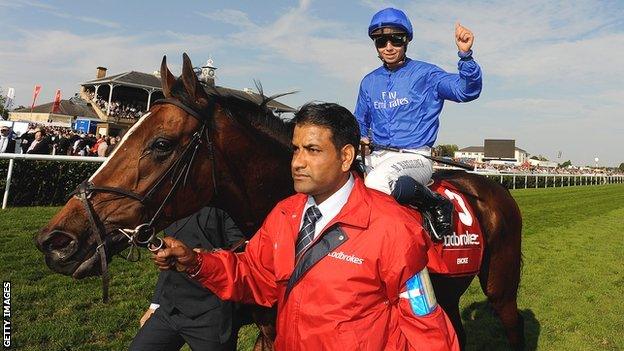Godolphin doping: St Leger winner Encke to retain trophies, says BHA
- Published

The British Horseracing Authority says there is no reason to strip St Leger winner Encke of his trophies despite the Godolphin doping scandal.
Encke is one of seven further horses formerly trained by Mahmood Al Zarooni to have tested positive for anabolic steroids.
"There is absolutely no evidence at all that he [Encke] was gaining benefit from prohibited substances in the St Leger," said the BHA.
The colt passed a drugs test after winning the St Leger last September.
During April, all 391 Godolphin horses in training at Newmarket were examined and seven more cases of doping, including Encke, on top of 15 already admitted, were discovered.
Encke, a 25-1 outsider, held off Camelot by three-quarters of a length to win the most recent running of racing's oldest Classic, staged at Doncaster since 1776.
The victory thus denied Camelot, the winner of the season's 2000 Guineas and Epsom Derby, flat racing's historic Triple Crown, not completed in more than 40 years.
Following his victory, ridden by Mickael Barzalona, Encke returned negative samples at the routine post-race testing, just as he had earlier in the season.
While Camelot's owners at the Coolmore racing operation in Ireland have declined to comment on the matter, others have suggested that Encke's win should be re-checked. But racing's regulator has dismissed that course of action.
"We deal in facts and evidence," BHA communications manager Robin Mounsey said.
"He was tested on the day and before at York, so we can be certain he was not under the benefits of substances."
And, Mounsey added, the samples taken from the horse, who like all those involved is banned from racing until October, no longer exist.
"We store blood samples taken from horses tested in training for five years, but it is standard practice to destroy negatives taken on the racecourse seven days after they've been cleared," he said.
"Anyway, there's been no change to our systems so they'd come up with the same results."
- Published20 May 2013
- Published30 April 2013
- Published23 April 2013
- Published18 May 2013
- Published4 May 2013
- Published15 September 2012